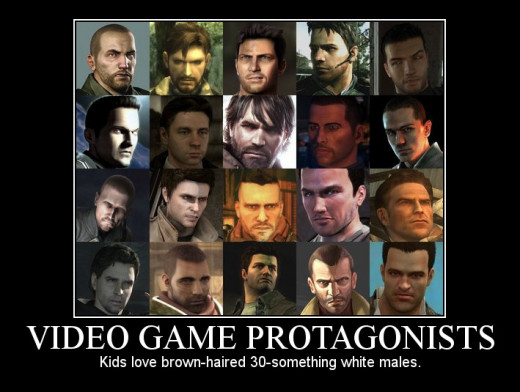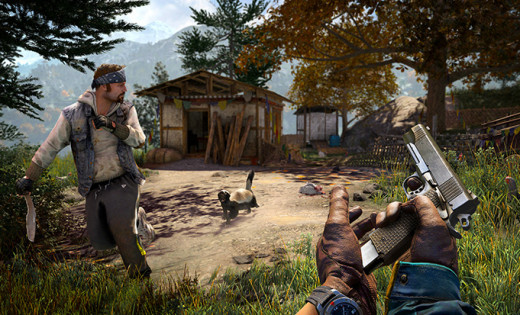Should More Games Offer Customizable Characters?
FemShep: The Poster Child of Customizable Characters

Now that AAA game studios have pretty much solved the problem of visual fidelity in graphics, it's time to begin looking for some new conquests. AI is one area where I definitely hope to see significant progress in upcoming years, but in this article I'd like to focus on something a little humbler: character customization.
Like realistic ragdoll physics and dynamic lighting, customizable characters are already a standard feature of many games. Most MMOs provide some sort of customization, as do many single-player RPGs (Skyrim and Mass Effect come to mind), but it seems to me that many of the pressing diversity issues that are being raised these days in relation to AAA franchises could be avoided simply by making character customization a standard feature in most big budget games. Mass Effect and Skyrim were both enormously successful and at least part of that success can be attributed to the games' broad demographic appeal.
In spite of this apparently obvious solution to a pernicious industry-wide problem, most big budget AAA games still force the player to take on the role of a white male protagonist. So why don't more games let you customize your character?
In this article I take a look at some of the most common objections.

First Objection: Tone
Developers often cite the tone or plot of the narrative as a reason for selecting a specific race and gender for their principal protagonist(s). And indeed there are narratives where this argument makes sense. (I think GTA 5 actually qualifies in this regard.) But I think most of the time this is a fairly shallow defense.
When you really sit down and think about the plot of most game narratives, you realize that the ones that actually depend to any non-negligible extent on the race and gender of the protagonist are the exceptions rather than the rule. In the majority of games there is simply no good reason to prefer one race or gender over another. At worst, as far as the plot goes, allowing the players to customize their characters means making a few changes to certain lines of dialog and recording some extra voiceovers. Mass Effect has already demonstrated that giving players the ability to customize their character's gender and appearance is not at odds with the construction of a deep and satisfying narrative.

Second Objection: Budget Constraints
Admittedly, there is a cost associated with the production of art assets, motion capture and animation, and the quality control issues that arise from these expanded assets when making your game inclusive. Writers have to write a few more lines of dialog, and actors have to record them. Many gamers who don't see diversity as an issue point to rising development costs and production schedules as an argument against investing valuable resources in what is, in their minds, an expendable feature.
But that's actually part of my point: the industry has already invested thousands of hours and tens of millions of dollars in solving relatively obscure details of visual fidelity; were these features more important than making those games inclusive? Did they provide more gamers with more pleasure than the option to play as a character they could relate to? There's simply no way to know, but at this point, when companies are pushing at the very edge of realism, there's no reason for them not to start redirecting some of that money and labor toward producing a different kind of visual fidelity, one that captures the diversity of humanity.

Third Objection: Marketing to Core Demographics
It seems to me that the number one reason why developers still focus on one specific race and gender when designing their protagonist still boils down to the financial incentive to appeal to their largest core demographic. Superficially, this makes a certain kind of sense: production costs are enormous and companies can't afford to indulge in unnecessary risks. Many gamers do base their purchasing decisions at least in part on whether or not they can identify with the playable protagonist; if they didn't, there wouldn't be a diversity issue in the first place. It's foolish to deny the realities of consumer preferences.
Ultimately, though, I don't believe that this argument is tenable because the technology required to solve the diversity problem already exists. Many games (The Elder Scrolls, Saints Row, etc.) have been doing it for years so there's really no reason not to build customizable characters into your game engine the same way you build particle physics or realistic lighting. The world is full of people who are not white and male (in fact, the majority are neither) and by making this single change to the way big budget games are currently being developed developers could instantly sidestep the entire issue; better still, it expands the core demographic to such an extent that virtually everyone feels included. Making fully customizable characters par for the course in AAA titles -- barring certain exceptions, which I will discuss below -- should be a new standard in modern video game design.
With the most obvious objections out of the way, are there still cases where customizable characters won't work? Let's look at a few types of games where customization might seem superfluous or actively harmful.

Exception: First Person Games
Now, some people might argue that, in the case of games played from the first person perspective, giving players the ability to customize their character is entirely irrelevant. If you never get to see your avatar directly, why does it matter?
To begin with, if the game is multiplayer, other people do see the player's avatar and in that case it becomes a matter of self-expression. But even in a first person single player game a certain degree of customization is desirable. Facial customization is probably unnecessary, but being allowed to select your race and gender is still important. In modern first person games, you see your character's arms and hands (and sometimes their legs and feet) and you certainly hear their shouts and curses when they take a pummeling from the bad guys. These details have a definite psychological impact on the player's experience and allowing the player to have some degree of control over this experience is a strong aid to immersion the same way that realistic shadows are an aid to immersion. Superficially, it might not seem like Far Cry 4 needs first person female character models, but Dead Island included them and it is a better game because of it.

Exception: Family Resemblances
One argument that could be made against making character customization a standard feature is the 'family resemblance' issue: if you allow the player to customize their character, what do you do about their NPC relatives if they happen to make an appearance in the game?
Fallout 3 solved this problem by basing the protagonist's father's appearance on the settings provided by the player during customization. All in all, I think this is a minor issue. Family resemblance settings, should it even arise in a game, are just one of the details that need to be worked out for any robust character customization component of a game engine.

Exception: Realism
One exception that frequently arises in military shooters is that it's "not realistic" for male combatants to be replaced with female combatants.
Ignoring for the moment the role of women in combat, the argument, as far as the main single player campaign is concerned, is moot because this "glaring violation of realism" has no impact on the very players that are concerned about it. This "artistic license" only affects those players who have already expressed a preference to sacrifice "realism" for diversity. In other words, this argument only exists to police other people's enjoyment of a game!
Now, granted, multiplayer is an important component of most shooters, and I can understand how seeing female combatants could impact the enjoyment of those players who place a premium on realism. However, I think this problem is easy enough to fix by providing players with a choice between male-only and co-ed servers. Controversial, perhaps, but if it makes everyone happier I think the net benefits outweigh the negatives.

Exception: Charismatic Lead Protagonists
I mentioned previously that there are exceptions to the rule of standardized customization. I think we can let developers off the hook for certain games, like Max Payne and Tomb Raider, which are so heavily invested in the personality and history of their protagonists that the games don't make much sense without them.
But even here, even if the character's gender can't be easily exchanged, race is another issue. I have no problem imagining a world where Max Payne is African American or Lara Croft is East Asian. Most games present no strong arguments in favor of a rigid protagonist. Citing artistic integrity as a reason for denying players the opportunity to replace the generic, cardboard cutout soldiers that dominate military shooters in the industry is almost pathetic. If one of the goals of making these characters bland is to make it easy for players to self-insert, it's hard to argue that giving players a mechanic which makes it even easier for them to self-insert is a bad idea.

Exception: Licensed Characters
Related to the charismatic lead protagonist argument is a related argument against character customization that carries real weight: licensed characters.
I think most people would agree that it would be odd to give players the freedom to customize characters like Batman and Spider-Man, changing their race and gender willy-nilly. On the other hand, giving players this freedom could also be kind of awesome. Sure, it wouldn't be canonical, but like the realism issue addressed earlier, there are plenty of people out there who would be happy to sacrifice a little bit of continuity for the freedom to play as a superhero they can really identify with. I think developers might be surprised to discover just how many people would like to play as Batgirl or a black Spider-Man. Simply make the canonical version the default and allow those players who want to change it to change.

What About the Marketing?
Let's go back to the issue of marketing for a second.
Race and gender in advertising is a thorny subject, but it is also wholly separate from the purely mechanical issue of building customizable characters into your game engine. To a certain extent, it makes sense for publishers to target their core demographic when designing the box art and trailers, so I don't think that this problem is quite as tractable as the technical side of the issue. What I do think is that, for the most part, as Mass Effect demonstrated, you really only need to let people know that they can customize their character and your customer base will take the rest of the advertising campaign in stride.
The more enterprising and visionary marketing departments will no doubt find a way to make their advertisements more inclusive, but I don't think many players will take the developers to task for a lack of diversity in their marketing if the game itself is inclusive.

Artistic Integrity
I know some people will feel a legitimate concern at this point over artistic integrity. Should developers bow to political correctness and the will of the people?
I've already mentioned that I think there are a few cases where it makes sense to build a narrative around the experiences of a specific individual of a particular race and gender. But I think if most developers were really honest with themselves they would admit that the race and gender of their protagonist(s) isn't really that important; does it really matter that your multiplayer skin who never voices a single line of dialog is white and male? Is it essential to the player's experience? Does your strong, silent super-soldier, who does little more than grunt and kill his way through the game have to be a 30 year old white man with brown hair? In a lot of games, more than you might imagine, the race and gender of the protagonist is entirely irrelevant.
Now, it's useful to have inspiring concept art of a great character to work from during the design phase, and it's equally important to have a compelling character for the purpose of marketing your game, but giving players the ability to customize their character after all of this is said and done, so that they, too, can have an inspiring character to work from when playing the game, doesn't really have to impact the development process in a significant way. Developers can still design and market the game with a specific character in mind and, so long as they attend to the minor cosmetic details associated with giving the players the freedom to change that character's gender and appearance after they install it, nothing else needs to happen.
It's an idea whose time has come. Here's hoping that the next big wave in modern game design is a little more inclusive.





